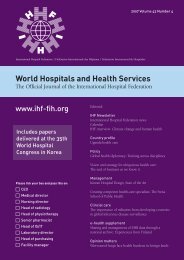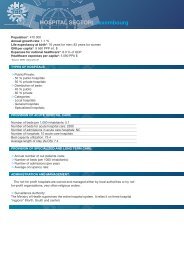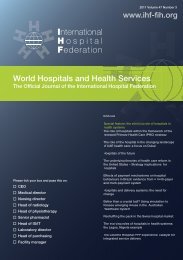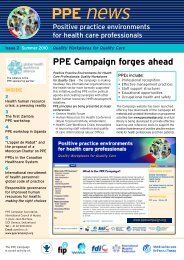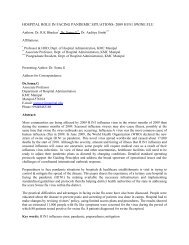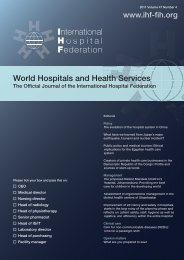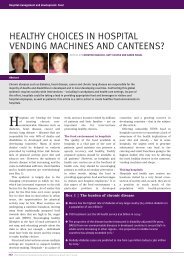World Hospitals and Health Services - International Hospital ...
World Hospitals and Health Services - International Hospital ...
World Hospitals and Health Services - International Hospital ...
You also want an ePaper? Increase the reach of your titles
YUMPU automatically turns print PDFs into web optimized ePapers that Google loves.
E-HEALTH SUPPLEMENT: CANADIAN PERSPECTIVE<br />
In 1994, a number of government <strong>and</strong> nonprofit health <strong>and</strong><br />
statistics agencies were consolidated under CIHI, to improve<br />
the health of Canadians <strong>and</strong> the health system. M<strong>and</strong>ated by<br />
Canada’s federal, provincial <strong>and</strong> territorial health ministers,<br />
CIHI is a national, not-for-profit organisation responsible for<br />
developing <strong>and</strong> maintaining the country's comprehensive<br />
health information system.<br />
CIHI’s core e-health related functions include identifying<br />
health information needs <strong>and</strong> priorities; <strong>and</strong> collecting,<br />
processing <strong>and</strong> maintaining data for comprehensive <strong>and</strong><br />
growing health databases covering human resources, health<br />
services <strong>and</strong> expenditures. CIHI also coordinates the setting<br />
of national st<strong>and</strong>ards for financial, statistical <strong>and</strong> clinical<br />
data, as well as st<strong>and</strong>ards for health informatics, such as<br />
HL7, <strong>and</strong> telematics.<br />
Since 1999, CIHI has led the Roadmap Initiative<br />
collaborative effort between CIHI, Statistics Canada, <strong>Health</strong><br />
Canada <strong>and</strong> many other groups at the national, provincial,<br />
territorial, regional <strong>and</strong> local levels. The initiative’s aims<br />
include the development of new national data holdings,<br />
exp<strong>and</strong>ing existing ones, <strong>and</strong> fostering better data <strong>and</strong><br />
technical st<strong>and</strong>ards for gathering information <strong>and</strong> for data<br />
protection.<br />
CIHI has helped shape the national agenda for information<br />
management <strong>and</strong> information technology st<strong>and</strong>ards in health<br />
care. It provides a neutral forum for st<strong>and</strong>ards discussion<br />
among Canada’s health <strong>and</strong> health IT leaders.<br />
Also leading the way in the e-health domain is Canada<br />
<strong>Health</strong> Infoway, an independent, not-for-profit corporation<br />
established by the federal, provincial <strong>and</strong> territorial<br />
governments, whose mission is to accelerate the development<br />
of compatible electronic health information systems across<br />
Canada. These systems provide health care professionals with<br />
rapid access to complete <strong>and</strong> accurate patient information,<br />
enabling better decisions about treatment <strong>and</strong> diagnosis. The<br />
result is a sustainable, more cost-efficient health care system<br />
offering improved patient safety <strong>and</strong> better quality of care.<br />
Infoway began operations in 2001 with an initial funding of<br />
$500 million. This was increased twice – an additional $600<br />
million in 2003 <strong>and</strong> another 100 million in 2004. Its<br />
members are the federal, provincial <strong>and</strong> territorial deputy<br />
ministers of health. Infoway’s initial programme areas<br />
included infostructure, registries, drug, laboratory <strong>and</strong> digital<br />
imaging systems. Telehealth expansion <strong>and</strong> public health<br />
surveillance system development were added along with<br />
further funding in 2003 <strong>and</strong> 2004 respectively.<br />
The vision of Infoway is a high-quality, sustainable <strong>and</strong><br />
effective health care system supported by an interoperable<br />
pan-Canadian electronic health record that provides residents<br />
<strong>and</strong> health care providers timely, appropriate <strong>and</strong> secure<br />
access to the right information whenever <strong>and</strong> wherever they<br />
enter the health care system. The goal is to have 50% of all<br />
Canadians connected to the EHR by the end of 2009.<br />
The Infoway mission is to foster <strong>and</strong> accelerate the<br />
development <strong>and</strong> adoption of electronic health information<br />
systems with compatible st<strong>and</strong>ards <strong>and</strong> communication<br />
technologies on a pan-Canadian basis. The objectives of the<br />
Infoway corporation are:<br />
➜ to accelerate the development <strong>and</strong> adoption of modern<br />
systems of health information <strong>and</strong> communication<br />
technologies;<br />
➜ to define <strong>and</strong> promote st<strong>and</strong>ards governing shared data<br />
to ensure the compatibility of health information<br />
networks;<br />
➜ to support the adoption of such st<strong>and</strong>ards for health<br />
information <strong>and</strong> compatible communications<br />
technologies for the health sector;<br />
➜ to enter into collaborative arrangements as required with<br />
the governments of Canada, provinces <strong>and</strong> territories,<br />
corporations, not-for-profit organisations <strong>and</strong> other public<br />
<strong>and</strong> private partners for the development <strong>and</strong> adoption of<br />
st<strong>and</strong>ards <strong>and</strong> technologies; <strong>and</strong><br />
➜ to incorporate st<strong>and</strong>ards that protect personal privacy<br />
<strong>and</strong> confidentiality of individual records <strong>and</strong> security of<br />
health information.<br />
Infoway now has over 90 projects underway across Canada,<br />
working with partners in the jurisdictions to define replicable<br />
solutions for establishing the building blocks of the<br />
interoperable pan-Canadian Electronic <strong>Health</strong> Record.<br />
The provincial governments are active players in the<br />
development of these e-health initiatives. The Newfoundl<strong>and</strong><br />
<strong>and</strong> Labrador Centre for <strong>Health</strong> Information, for example, was<br />
m<strong>and</strong>ated by the province to develop a <strong>Health</strong> Information<br />
Network (HIN) to link provincial hospitals, long-term care<br />
facilities, doctors, pharmacists, <strong>and</strong> health <strong>and</strong> community<br />
services. The Saskatchewan <strong>Health</strong> Information Network is<br />
establishing electronic connections to enable access to various<br />
types of health <strong>and</strong> patient information between health service<br />
sites across the province, including physicians’ offices, health<br />
centres, home care providers, hospitals, emergency response<br />
sites <strong>and</strong> nursing homes. Alberta Wellnet was founded in<br />
1997 to address access to <strong>and</strong> the quality of health care, <strong>and</strong><br />
the increasing costs associated with care delivery. Alberta<br />
Wellnet is the umbrella for a series of province-wide <strong>and</strong><br />
regional initiatives to build an integrated health information<br />
network in that province <strong>and</strong> to facilitate improvements to the<br />
delivery of health services by improving access to health<br />
information. Infoway is working with these groups to define<br />
solutions such as client registries <strong>and</strong> drug information<br />
systems that can be replicated in other parts of Canada <strong>and</strong><br />
form the basis of an ‘interoperable’ electronic health record.<br />
Challenges presented by the accessibility <strong>and</strong> provision of<br />
care in remote communities have been under considerable<br />
scrutiny. In recent years numerous e-health initiatives have<br />
been actively addressing the challenge presented by<br />
geography. Programmes such as Ontario’s NORTH (Northern<br />
Ontario Remote Telecommunications <strong>Health</strong>) Network <strong>and</strong><br />
the British Columbia Peace Liard Telemental <strong>Health</strong> provide<br />
remote specialist consultations, continuing medical education<br />
<strong>and</strong> patient education to isolated locations. They utilise twoway<br />
television <strong>and</strong> simultaneous transmission of visual <strong>and</strong><br />
audio signals from various medical peripheral devices, such as<br />
electronic stethoscopes <strong>and</strong> otoscopes. Infoway is also<br />
working with partners in the jurisdictions to find ways of<br />
increasing <strong>and</strong> exp<strong>and</strong>ing the utilisation of telehealth<br />
solutions to better serve remote <strong>and</strong> aboriginal communities<br />
across the country.<br />
Challenges concerning st<strong>and</strong>ards, technologies <strong>and</strong> product<br />
34 | <strong>World</strong> <strong><strong>Hospital</strong>s</strong> <strong>and</strong> <strong>Health</strong> <strong>Services</strong> | Vol. 40 No. 4



